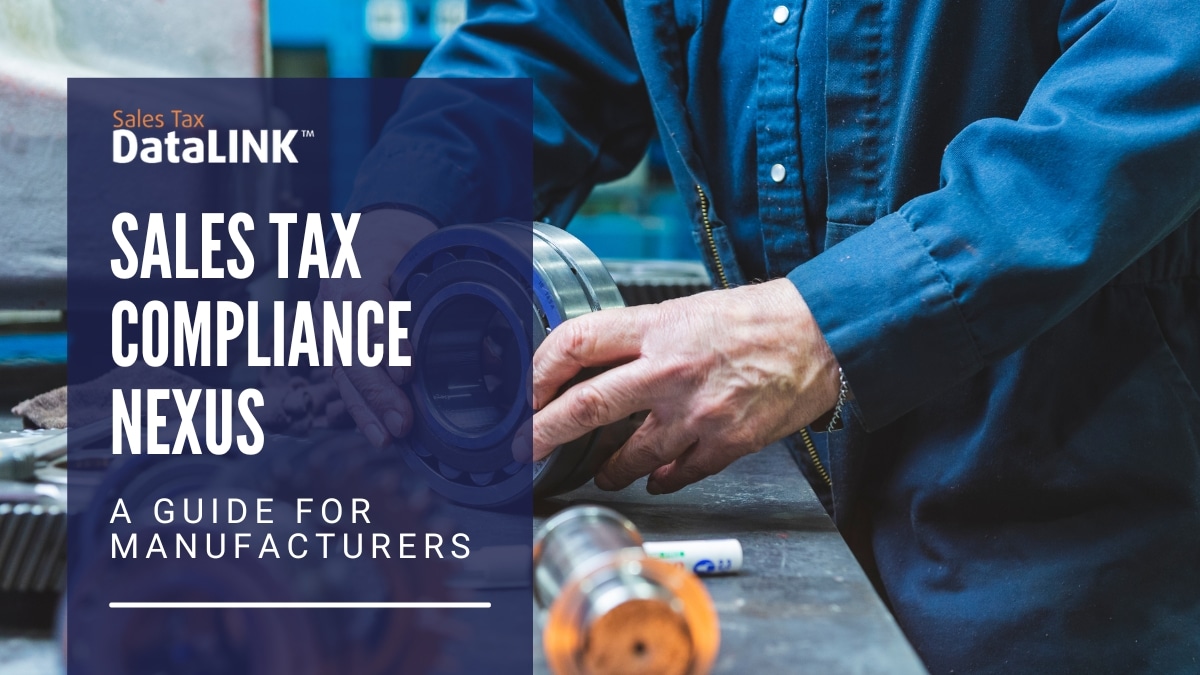Sales tax compliance nexus for manufacturers is more likely to be an issue today than it was a few years ago. In 2018, the Supreme Court ruled in the Wayfair case that states could require remote sellers to collect and file sales tax. That is, companies without a physical presence in a state could be ruled to have nexus anyway. Exactly how to determine nexus now is up to each state. By now, every state with a sales tax has passed laws requiring remote sellers to register, collect, calculate, file, and remit sales tax under conditions determined by that state, plus its municipal sales tax jurisdictions. Even some states with no state sales tax now allow their municipalities to collect sales taxes from remote sellers.
https://www.salestaxdatalink.com/blog/understanding-sales-tax-nexus/
Manufacturers may think that sales tax compliance is not an issue for them because they make most of their sales to resellers, on a wholesale basis. That doesn’t mean you can just close your eyes to sales tax compliance. Here are a few of the issues that affect manufacturers’ sales tax obligations.
Wholesale only?
Each state has its own rules and regulations for sales tax. Some states determine economic nexus on the basis of taxable sales only, but some include wholesale revenue as well. Washington state, for example, sets its threshold for economic nexus on the basis of “all Washington income, including retailing, wholesaling, service, and other activities.” This means that even if your sales in Washington State are nearly all wholesale and your taxable sales don’t reach the threshold amount, you still have to register, collect sales tax for taxable sales, and file if your total revenue from Washington State reaches the threshold.
For every state where you do business, you need to find out whether you meet the threshold for economic nexus — and you also have to find out whether you have to count your wholesale transactions as well. You don’t have to collect sales tax on those transactions, of course, but you still must count them when you determine whether or not you have nexus.
You also have to be accurate when you’re thinking about wholesale vs. retail. You might not feel that your online sales of replacement parts really count as retail, but they do, from the point of view of the sales tax nexus.
https://www.salestaxdatalink.com/blog/manufacturers-are-you-selling-directly/
Click-through nexus
Most states now use economic nexus — the total amount of sales to consumers and in a decreasing number of states the number of transactions — to gauge sales tax nexus for businesses. But some states still have “click-through nexus” laws on the books. These states require sales tax compliance for companies that have a virtual connection with their state.
The most common example of this is affiliate marketing. If your company pays a commission to online publishers when someone clicks through their web link to your company, the states where they live and work may use that fact to establish that your company has sales tax nexus in their state.
Banner ads on a website can also trigger click-through nexus. Many states have repealed click-through nexus laws, but some states still keep and enforce them. These laws may have their own thresholds, which may match the remote seller thresholds or be different from them.
Exemption certificates
If you make no sales directly to consumers, you still have one issue to keep in mind. In order to prove that your sales are wholesale and therefore not subject to sales tax, you must have exemption certificates for each reseller in each tax jurisdiction.
There are often time guidelines for receiving and filing these certificates, and you must make sure that you keep them up to date. You also have to keep them on file after the sale. The amount of time you must keep them on hand is, of course, up to each individual state.
If an exemption certificate is deemed invalid, your company will be responsible for making up the sales tax you should have collected. The customer is not responsible once the sale is made.
And did you notice that you need an exemption certificate for each tax jurisdiction, even if you’re working with a single multi-state company?
Do you really need to keep up with all this?
Making mistakes with sales tax compliance can be very costly and stressful, but it’s also very important. Fortunately, you have an alternative: outsource your sales tax compliance to Sales Tax DataLINK. Contact us today to learn more.
Image courtesy of Adobe




